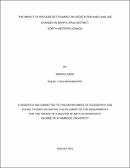| dc.description.abstract | With increasing refugee influx into Uganda, environmental degradation especially of vegetation cover, with possible irreversible effects is likely in refugee hosting centers. This study aimed at ascertaining the impact of refugee settlement on vegetation and land use changes in Imvepi in Arua District-Uganda. Specifically, the study sought to; to examine the extent and trend of vegetation and land use changes between 2016 and 2019, assess the quantities of fuel-wood harvested by refugees and to analyze the determinants of fuel-wood usage by refugees. Sentinel 2A Imagery data of the study area for four years (2016-2019) were used to map the changes in vegetation and land use, using the Maximum likelihood classification algorithm in QGIS 3.12 software. Following a cross-sectional study design, a sample of 221 households from refugees and hosting community were selected using systematic random and purposive sampling procedures. From these, socio-economic data was collected using questionnaire, interview and focused group discussions. The collected data was analyzed using descriptive statistics, Multiple Response and content analyses. At inferential level, statistical tests were computed using Paired-Samples T-Test and Binomial Statistical Test. Results showed that, woodlands and bushlands declined by 19% and 7%, respectively whilst farmland increased by 27% during the period under study. Refugees collected an average daily head-weight of wet and dry wood of 16 and 12 kg, respectively while average daily, and weekly weight of 2 kg and 1.2 basins of charcoal, respectively. The quantities of dry and wet fuel-wood harvested and used by refugees varied significantly. Family size, culture, poverty, type of food cooked, weak enforcement of environmental policies and methods of cooking significantly determined the quantities of wood and charcoal harvested and used in Imvepi refugee settlement. The study concludes that settling refugees in Imvepi has caused woodland and bushland vegetation degradation. The decision was associated with the need for built-up infrastructure, agricultural land expansion and large-scale fuel-wood consumption. Therefore, programs to revegetate degraded wood and bushlands, restrict refugee numbers at given settlements, promote use of fuel-wood saving techniques, and improve the economic status of refugee households should be emphasized by the UNHCR and the government. | en_US |

